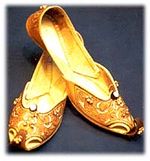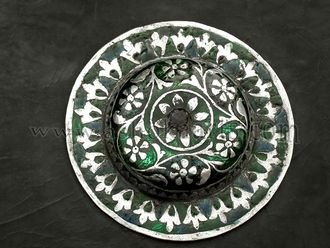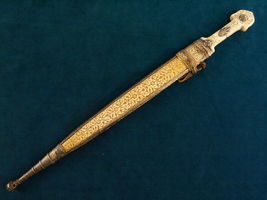The Brass Coast look and feel
No edit summary |
|||
| Line 7: | Line 7: | ||
''Also see [[The Brass Coast costumes]] and [[The Brass Coast icons and artistry]].'' | ''Also see [[The Brass Coast costumes]] and [[The Brass Coast icons and artistry]].'' | ||
==Influences== | |||
The traditional looks of Moorish Spain, Morocco, Algeria, Tunisia. | The traditional looks of Moorish Spain, Morocco, Algeria, Tunisia. | ||
{{CaptionedImage|file=BrassCostume1.jpg|align=right|width=225|caption=Image from [http://www.imdb.com/title/tt0181199/ Arabian Nights]}} | {{CaptionedImage|file=BrassCostume1.jpg|align=right|width=225|caption=Image from [http://www.imdb.com/title/tt0181199/ Arabian Nights]}} | ||
==Feel== | |||
Free, flowing, headstrong, sumptuous, practical, exuberant, hedonistic, colourful, rich, joyful. | Free, flowing, headstrong, sumptuous, practical, exuberant, hedonistic, colourful, rich, joyful. | ||
| Line 18: | Line 17: | ||
Lightweight fabrics such as voiles and chiffons, either silk or synthetic. Also silks, brocades and other rich fabrics. Leather is considered unappealing for clothing, it’s a heavy material they reserve for boots and armour. Gold is prized over silver where available. | Lightweight fabrics such as voiles and chiffons, either silk or synthetic. Also silks, brocades and other rich fabrics. Leather is considered unappealing for clothing, it’s a heavy material they reserve for boots and armour. Gold is prized over silver where available. | ||
{{CaptionedImage|file=BrassDress.jpg|align=left|width=175}} | {{CaptionedImage|file=BrassDress.jpg|align=left|width=175}} | ||
==Colours== | |||
Bright, vibrant colours, especially the colours of flames: strong bright yellows, brilliant oranges and every conceivable shade of red as well as gold and silver. Peacock blue, Magenta and Turquoise often appear for contrast. Expensive clothing is made in brightly coloured layers to convey the impression of the fire within. | Bright, vibrant colours, especially the colours of flames: strong bright yellows, brilliant oranges and every conceivable shade of red as well as gold and silver. Peacock blue, Magenta and Turquoise often appear for contrast. Expensive clothing is made in brightly coloured layers to convey the impression of the fire within. | ||
Black is considered severe and used for shrouds to wrap the dead. White is the colour of the poor, of those too impoverished to afford exotic dyes. | Black is considered severe and used for shrouds to wrap the dead. White is the colour of the poor, of those too impoverished to afford exotic dyes. | ||
{{CaptionedImage|file=Brass_coast_slippers.jpg|width=150|align=right}} | {{CaptionedImage|file=Brass_coast_slippers.jpg|width=150|align=right}} | ||
==Clothing== | |||
Veils, scarves, head-wraps, pantaloons, loose shirts and kaftans, are all part of Freeborn garb. Clothing is usually worn loose with layers of draped material slashed through to show a wealth of colour, and secured with sashes rather than belts. Outfits will often be decorated with shiny jewellery, bells, coins showing wealth in the glint of metal in the sun and the sound of metal as the wearer moves. Scabbards or pouches tend to hang at the waist by a silk cord that goes over the shoulder | Veils, scarves, head-wraps, pantaloons, loose shirts and kaftans, are all part of Freeborn garb. Clothing is usually worn loose with layers of draped material slashed through to show a wealth of colour, and secured with sashes rather than belts. Outfits will often be decorated with shiny jewellery, bells, coins showing wealth in the glint of metal in the sun and the sound of metal as the wearer moves. Scabbards or pouches tend to hang at the waist by a silk cord that goes over the shoulder | ||
| Line 30: | Line 31: | ||
Many Freeborn favour sandals as footwear, lacing up over the foot or higher up the leg, but slipper shoes are also common. Leather boots to mid calf or the knee are favoured particularly on the battle field. | Many Freeborn favour sandals as footwear, lacing up over the foot or higher up the leg, but slipper shoes are also common. Leather boots to mid calf or the knee are favoured particularly on the battle field. | ||
==Jewellery, veils and decoration== | |||
Jewellery is commonly used either as part of the clothes themselves or to frame the face or hands to draw attention to them. Veils are fashionable for men and women who wish to appear mysterious and alluring. Those who go tattoed tend to favour intricate henna style designs. | Jewellery is commonly used either as part of the clothes themselves or to frame the face or hands to draw attention to them. Veils are fashionable for men and women who wish to appear mysterious and alluring. Those who go tattoed tend to favour intricate henna style designs. | ||
<row-fluid> | <row-fluid> | ||
| Line 39: | Line 40: | ||
</row-fluid> | </row-fluid> | ||
==Scale armour== | |||
Scale is the armour many Freeborn aspire to, ideally in a bright golden colour, worn like mail or else secured with leather. | Scale is the armour many Freeborn aspire to, ideally in a bright golden colour, worn like mail or else secured with leather. | ||
<row-fluid> | <row-fluid> | ||
| Line 47: | Line 48: | ||
</row-fluid> | </row-fluid> | ||
==Mail armour== | |||
Mail in the jannissary style, particularly the chain helmets, is also commonly seen. Small pieces of plate or breastplates are popular especially if ornate and inlaid. Armour, whether metal or leather, usually has embellished edges and rich decoration, with calligraphy and ornate designs. | Mail in the jannissary style, particularly the chain helmets, is also commonly seen. Small pieces of plate or breastplates are popular especially if ornate and inlaid. Armour, whether metal or leather, usually has embellished edges and rich decoration, with calligraphy and ornate designs. | ||
<row-fluid> | <row-fluid> | ||
| Line 55: | Line 56: | ||
</row-fluid> | </row-fluid> | ||
==Shields== | |||
The Freeborn favour round (ideally domed) metal shields, highly decorated if possible. Gold inlay and engraving are both particularly popular. | The Freeborn favour round (ideally domed) metal shields, highly decorated if possible. Gold inlay and engraving are both particularly popular. | ||
| Line 63: | Line 64: | ||
</row-fluid> | </row-fluid> | ||
==Weapons== | |||
Scimitars are less common than straight swords and axes which are the preferred weapons. The Bhuj, a large heavy single-bladed spear, is the ideal pole-arm. The best quality weapons are intricately etched and engraved with complex designs. | Scimitars are less common than straight swords and axes which are the preferred weapons. The Bhuj, a large heavy single-bladed spear, is the ideal pole-arm. The best quality weapons are intricately etched and engraved with complex designs. | ||
| Line 72: | Line 73: | ||
</row-fluid> | </row-fluid> | ||
==Corsairs== | |||
[[Corsairs]] epitomize Freeborn daring and adventure. Javelins and bows are common but the Catazarri crossbow is also used. Many are lightly armoured, but the most bold show off their success with ornately gilded plate. They may dress more simply than other Freeborn in trousers and tunic, but their flair for wealth tends to show through with jewellery worn at wrist and neck. | [[Corsairs]] epitomize Freeborn daring and adventure. Javelins and bows are common but the Catazarri crossbow is also used. Many are lightly armoured, but the most bold show off their success with ornately gilded plate. They may dress more simply than other Freeborn in trousers and tunic, but their flair for wealth tends to show through with jewellery worn at wrist and neck. | ||
| Line 80: | Line 81: | ||
</row-fluid> | </row-fluid> | ||
==Children== | |||
Children are an opportunity for parents to show off their wealth, dressing their offspring in traditional Freeborn styles. | Children are an opportunity for parents to show off their wealth, dressing their offspring in traditional Freeborn styles. | ||
| Line 87: | Line 88: | ||
</row-fluid> | </row-fluid> | ||
==Sutannir== | |||
[[Sutannir]] often paint their faces and skin with designs inspired by flames and themes of fire. They tend to be the most flamboyant of the Freeborn and frequently indulge in mutliple layered swirling robes. | [[Sutannir]] often paint their faces and skin with designs inspired by flames and themes of fire. They tend to be the most flamboyant of the Freeborn and frequently indulge in mutliple layered swirling robes. | ||
| Line 95: | Line 96: | ||
</row-fluid> | </row-fluid> | ||
== | ==Less appropriate== | ||
In defining the ideal look and feel for the Brass Coast we have chosen not to include some images. Some items were omitted so that the overall range of images avoids becoming too broad - we want each nation to look distinctive. Sometimes items were left out because the real world significance of them is so strong that it would impact the game, we want to avoid players confusing these nations with real world cultures. And some items are not part of the ideal because they come from a different historical period or are more modern in feel. It is common to see costume inspired by a range of historical periods but we wanted to be clear on what the ideal was. | |||
We've listed some of the items we chose not to include in the look and feel below along with a short explanation of why they are not perfect for the Brass Coast. It is ok to use these items as part of your kit, creating a costume is always a compromise as time and money are limited. What we want to do is be clear on the suggestions we are making, so that players who are looking to create new kit or add to their existing kit can be confident about what will look great for the nation. | |||
===Shemagh=== | |||
Some of the costume inspiration for the Brass Coast comes from cultures with strong Arabic influences, but the main focus was Moorish Spain and North Africa. The [http://en.wikipedia.org/wiki/Keffiyeh shemagh or keffiyeh], the traditional headscarf that is white or patterned is more typical of the Middle East and more importantly it often looks very modern. We recommend the tagelmust as the ideal head covering for the Brass Coast. | |||
===Sartorial Hijab=== | |||
The only distinction between Freeborn men and women is that the Freeborn trace their familial lines via their mothers. The traditional social attitudes towards modesty and women in Islamic societies are nothing to do with the Brass Coast emphasis on freedom and individuality. Because of this, and the strong real world associations, we chose to exclude most elements of [http://en.wikipedia.org/wiki/Sartorial_hijab sartorial hijab] from the look and feel for the nation. | |||
===Belly dancing costumes=== | |||
Although there are no particular modesty taboos, dancers tend to be far more interested in showing off how they can make fabrics flare and move than displaying their own flesh. Wild passionate dancing is a common Freeborn pursuit for men and women, but the perfect Freeborn costume features long flowing colourful garments. [http://www.youtube.com/watch?v=8eO_g0Rrx_w Roxanne's dance] from the movie Alexander is a great inspiration for Freeborn dancing and costume. | |||
[[Category:The Brass Coast]] | [[Category:The Brass Coast]] | ||
[[Category:Nations]] | [[Category:Nations]] | ||
Revision as of 12:19, 7 December 2012
Overview
The Freeborn look is one of bright colours, silks, jewels, and sumptuousness. They admire ornate or bejewelled items. To the Freeborn, a brilliant craftsman is one who can make something elegant as well as sturdy. Their weapons and armour are often engraved or adorned, but they are not fatuous, and do not compromise utility for the sake of appearance. Jewellery is very common with the best pieces, like necklaces, crowns or tiaras, designed to frame the wearer's hands or face.
The image of the flame is central to the Freeborn culture; they believe it represents their spirit: wild, powerful and unchained.
Also see The Brass Coast costumes and The Brass Coast icons and artistry.
Influences
The traditional looks of Moorish Spain, Morocco, Algeria, Tunisia.
Feel
Free, flowing, headstrong, sumptuous, practical, exuberant, hedonistic, colourful, rich, joyful.
Materials
Lightweight fabrics such as voiles and chiffons, either silk or synthetic. Also silks, brocades and other rich fabrics. Leather is considered unappealing for clothing, it’s a heavy material they reserve for boots and armour. Gold is prized over silver where available.
Colours
Bright, vibrant colours, especially the colours of flames: strong bright yellows, brilliant oranges and every conceivable shade of red as well as gold and silver. Peacock blue, Magenta and Turquoise often appear for contrast. Expensive clothing is made in brightly coloured layers to convey the impression of the fire within.
Black is considered severe and used for shrouds to wrap the dead. White is the colour of the poor, of those too impoverished to afford exotic dyes.
Clothing
Veils, scarves, head-wraps, pantaloons, loose shirts and kaftans, are all part of Freeborn garb. Clothing is usually worn loose with layers of draped material slashed through to show a wealth of colour, and secured with sashes rather than belts. Outfits will often be decorated with shiny jewellery, bells, coins showing wealth in the glint of metal in the sun and the sound of metal as the wearer moves. Scabbards or pouches tend to hang at the waist by a silk cord that goes over the shoulder
The ideal headgear is the tagelmust (preferably in bright red, orange or yellow rather than blue).
Many Freeborn favour sandals as footwear, lacing up over the foot or higher up the leg, but slipper shoes are also common. Leather boots to mid calf or the knee are favoured particularly on the battle field.
Jewellery, veils and decoration
Jewellery is commonly used either as part of the clothes themselves or to frame the face or hands to draw attention to them. Veils are fashionable for men and women who wish to appear mysterious and alluring. Those who go tattoed tend to favour intricate henna style designs.
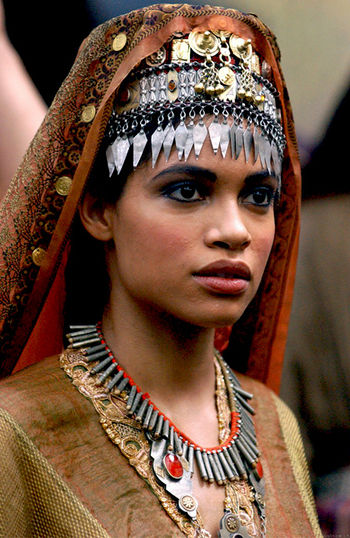
Scale armour
Scale is the armour many Freeborn aspire to, ideally in a bright golden colour, worn like mail or else secured with leather.
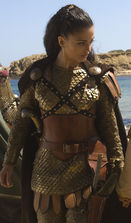
Mail armour
Mail in the jannissary style, particularly the chain helmets, is also commonly seen. Small pieces of plate or breastplates are popular especially if ornate and inlaid. Armour, whether metal or leather, usually has embellished edges and rich decoration, with calligraphy and ornate designs.
Shields
The Freeborn favour round (ideally domed) metal shields, highly decorated if possible. Gold inlay and engraving are both particularly popular.
Weapons
Scimitars are less common than straight swords and axes which are the preferred weapons. The Bhuj, a large heavy single-bladed spear, is the ideal pole-arm. The best quality weapons are intricately etched and engraved with complex designs.
Corsairs
Corsairs epitomize Freeborn daring and adventure. Javelins and bows are common but the Catazarri crossbow is also used. Many are lightly armoured, but the most bold show off their success with ornately gilded plate. They may dress more simply than other Freeborn in trousers and tunic, but their flair for wealth tends to show through with jewellery worn at wrist and neck.
Children
Children are an opportunity for parents to show off their wealth, dressing their offspring in traditional Freeborn styles.
Sutannir
Sutannir often paint their faces and skin with designs inspired by flames and themes of fire. They tend to be the most flamboyant of the Freeborn and frequently indulge in mutliple layered swirling robes.
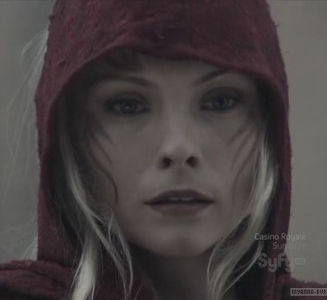
Less appropriate
In defining the ideal look and feel for the Brass Coast we have chosen not to include some images. Some items were omitted so that the overall range of images avoids becoming too broad - we want each nation to look distinctive. Sometimes items were left out because the real world significance of them is so strong that it would impact the game, we want to avoid players confusing these nations with real world cultures. And some items are not part of the ideal because they come from a different historical period or are more modern in feel. It is common to see costume inspired by a range of historical periods but we wanted to be clear on what the ideal was.
We've listed some of the items we chose not to include in the look and feel below along with a short explanation of why they are not perfect for the Brass Coast. It is ok to use these items as part of your kit, creating a costume is always a compromise as time and money are limited. What we want to do is be clear on the suggestions we are making, so that players who are looking to create new kit or add to their existing kit can be confident about what will look great for the nation.
Shemagh
Some of the costume inspiration for the Brass Coast comes from cultures with strong Arabic influences, but the main focus was Moorish Spain and North Africa. The shemagh or keffiyeh, the traditional headscarf that is white or patterned is more typical of the Middle East and more importantly it often looks very modern. We recommend the tagelmust as the ideal head covering for the Brass Coast.
Sartorial Hijab
The only distinction between Freeborn men and women is that the Freeborn trace their familial lines via their mothers. The traditional social attitudes towards modesty and women in Islamic societies are nothing to do with the Brass Coast emphasis on freedom and individuality. Because of this, and the strong real world associations, we chose to exclude most elements of sartorial hijab from the look and feel for the nation.
Belly dancing costumes
Although there are no particular modesty taboos, dancers tend to be far more interested in showing off how they can make fabrics flare and move than displaying their own flesh. Wild passionate dancing is a common Freeborn pursuit for men and women, but the perfect Freeborn costume features long flowing colourful garments. Roxanne's dance from the movie Alexander is a great inspiration for Freeborn dancing and costume.
